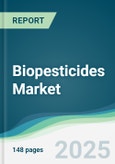The Biopesticides Market Study provides a comprehensive analysis of the global biopesticides market, delivering actionable insights for industry experts in agriculture, agribusiness, and sustainable farming sectors. This study explores the growing adoption of biopesticides as eco-friendly alternatives to chemical pesticides, segmented by type, crop type, application, and geography. By examining key market drivers, restraints, and competitive developments, the Biopesticides Market Study equips stakeholders with the knowledge to navigate this rapidly expanding market focused on sustainable agricultural practices.
Study Overview
The Biopesticides Market Study offers an in-depth examination of the biopesticides market, covering types such as bio-insecticides, bio-nematicides, bio-herbicides, bio-fungicides, and others, alongside crop types including fruits and vegetables, oilseeds and pulses, cereals and grains, and others. It analyzes application methods like foliar spray, soil treatment, seed treatment, and post-harvest, with a focus on market drivers like increasing demand for organic farming and regulatory support for sustainable agriculture, as well as restraints such as limited shelf life and high R&D costs. The study includes Porter’s Five Forces Analysis, industry value chain insights, and strategic recommendations, with regional breakdowns across North America, South America, Europe, Middle East and Africa, and Asia Pacific, highlighting growth opportunities in markets like the USA and India.Competitive Environment and Analysis
In the Biopesticides Market Study, the competitive environment section highlights strategic innovations from key players driving market growth. Recent developments from leading companies underscore the industry’s focus on sustainability and innovation:BASF: In 2024, BASF launched a new bio-fungicide formulation with enhanced efficacy against fungal pathogens in fruits and vegetables, reducing crop loss by up to 20% compared to traditional solutions. This advancement strengthens BASF’s position in the foliar spray segment, catering to the growing demand for organic produce in Europe and North America.
Corteva, Inc.: In early 2025, Corteva introduced a bio-insecticide with a novel microbial strain, improving pest control efficiency by 15% for cereals and grains. This development, paired with a strategic collaboration with a leading seed treatment technology provider, reinforces Corteva’s leadership in sustainable crop protection solutions for the Asia Pacific market.
The Biopesticides Market Study also includes a market share analysis, detailing mergers, acquisitions, and collaborations, such as Syngenta Crop Protection AG’s 2024 acquisition of a biotech firm specializing in bio-nematicides to expand its portfolio for oilseeds and pulses. The competitive dashboard provides a clear view of these dynamics, enabling industry experts to assess market positioning and strategic trends.
Conclusion
The Biopesticides Market Study is an essential resource for industry experts seeking to understand the competitive and technological landscape of the biopesticides market. By spotlighting key developments from players like BASF and Corteva, alongside comprehensive segmentation and regional insights, this study empowers stakeholders to make informed strategic decisions. As the shift toward sustainable agriculture accelerates, the Biopesticides Market Study offers a strategic guide for capitalizing on opportunities in this dynamic and environmentally critical market.Key Benefits of this Report:
- Insightful Analysis: Gain detailed market insights covering major as well as emerging geographical regions, focusing on customer segments, government policies and socio-economic factors, consumer preferences, industry verticals, and other sub-segments.
- Competitive Landscape: Understand the strategic maneuvers employed by key players globally to understand possible market penetration with the correct strategy.
- Market Drivers & Future Trends: Explore the dynamic factors and pivotal market trends and how they will shape future market developments.
- Actionable Recommendations: Utilize the insights to exercise strategic decisions to uncover new business streams and revenues in a dynamic environment.
- Caters to a Wide Audience: Beneficial and cost-effective for startups, research institutions, consultants, SMEs, and large enterprises.
What do businesses use our reports for?
Industry and Market Insights, Opportunity Assessment, Product Demand Forecasting, Market Entry Strategy, Geographical Expansion, Capital Investment Decisions, Regulatory Framework & Implications, New Product Development, Competitive IntelligenceReport Coverage:
- Historical data from 2022 to 2024 & forecast data from 2025 to 2030
- Growth Opportunities, Challenges, Supply Chain Outlook, Regulatory Framework, and Trend Analysis
- Competitive Positioning, Strategies, and Market Share Analysis
- Revenue Growth and Forecast Assessment of segments and regions including countries
- Company Profiling (Strategies, Products, Financial Information, and Key Developments among others).
Different segments covered under the biopesticides market report are as below:
By Type
- Bio-Insecticides
- Bio-Nematicides
- Bio-Herbicides
- Bio-Fungicides
- Others
By Crop Type
- Fruits and Vegetables
- Oilseeds and Pulses
- Cereals and Grains
- Others
By Application:
- Foliar Spray
- Soil Treatment
- Seed Treatment
- Post-Harvest
- Others
By Geography
- North America
- United States
- Canada
- Mexico
- South America
- Brazil
- Argentina
- Others
- Europe
- United Kingdom
- Germany
- France
- Spain
- Others
- Middle East and Africa
- Saudi Arabia
- UAE
- Israel
- Others
- Asia Pacific
- Japan
- China
- India
- South Korea
- Indonesia
- Thailand
- Others
Table of Contents
Companies Mentioned
- BASF
- Bayer AG
- Certis USA LLC
- FMC Corporation
- Isagro
- Syngenta Crop Protection AG
- Sumitomo Chemical Co., Ltd.
- FMC Corporation
- Corteva, Inc.
- Koppert B.V.
Table Information
| Report Attribute | Details |
|---|---|
| No. of Pages | 148 |
| Published | July 2025 |
| Forecast Period | 2025 - 2030 |
| Estimated Market Value ( USD | $ 9.59 Billion |
| Forecasted Market Value ( USD | $ 14.752 Billion |
| Compound Annual Growth Rate | 9.0% |
| Regions Covered | Global |
| No. of Companies Mentioned | 10 |









